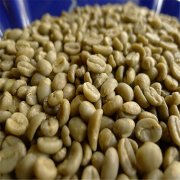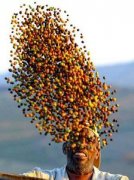Papua New Guinea Coffee from Asian boutique Coffee beans
In recent years, Papua New Guinea Coffee began to wash Arabica beans with its own unique high-quality water, representing Asia to enter the ranks of the world specialty coffee. The coffee style of Papua New Guinea has the characteristics of full particles, moderate acidity and mellow taste.

Papua New Guinea is an island country in Oceania. In Malay, "Papua" means "curly hair". It is said that in 1545, the explorer Retes arrived on the island and found that most of the people's hair on the island was curly, that is, the island was called "the island of curly hair", so the name was handed down.
Located in tropical Papua New Guinea, the climate is humid and rainy, rich in coconuts and coffee. Forests and mineral resources are also rich. Rabur is the sixth largest town in the South Pacific island nation and an important shipping hub. Its rich coffee and other goods are exported from this port. Papua New Guinea has a detached and primitive natural environment and its land is vast and fertile. Its unique volcanic rock soil and abundant rainfall create excellent natural conditions for the growth of coffee. The top coffee beans in Papua New Guinea are as beautiful and precious as the country's national bird of paradise. As coffee in the country is widely grown in the highlands of 1300 to 1800 meters above sea level, coffee beans are plump and varied in taste, with pleasant acidity and fruit-like sweetness.

The coffee production in Papua New Guinea is not very high, and its coffee beans are carefully washed Arabica beans. Generally washed coffee beans are full of bright fruit aromas, but do not have a strong acidity. It is characterized by a silk-like soft taste and excellent aroma, moderate acidity, is a relatively rare variety of high-alcohol and medium-acidity coffee, whether it is used to mix Italian coffee or general comprehensive coffee, can make up for the lack of sour coffee.
If you taste Papua New Guinea coffee beans with Guatemala Antigua coffee, it will have a different taste. As we all know, Papua New Guinea coffee has the characteristics of fruit flavor and herbal aroma, while Guatemala Antigua coffee has a slightly spicy and cocoa flavor. The tip of the tongue has both fragrant fruit flavor and cocoa flavor, the two flavors blend and collide, giving people a unique new coffee experience. (this article is reprinted)
Important Notice :
前街咖啡 FrontStreet Coffee has moved to new addredd:
FrontStreet Coffee Address: 315,Donghua East Road,GuangZhou
Tel:020 38364473
- Prev

Boutique Coffee learn Fine Coffee Coffee beans
Ethiopia Yejia Sheffield Mocha (Ethiopia Yirgacheffe) is the hometown of coffee. Thousands of years of planting history and processing tradition in Ethiopia have created high-quality washed Arabica beans. Ethiopia's Yirgacheffe coffee is one of the most unique coffee beans in the world today: it has a strong nostrils.
- Next

Santo Domingo coffee from Dominica, the country where boutique coffee beans are produced.
Santo Domingo is a city with a history of 500 years. Coffee produced by Santo Domingo and Barney, which is almost synonymous with Domiga coffee, is a world-famous high-quality coffee. Its flavor and taste characteristics: fresh and elegant, full particles, excellent acidity, pleasant aroma. The Dominican Republic is located in the east of the island of Haiti in the West Indies, bordering the Republic of Haiti in the west and the Atlantic Ocean in the north.
Related
- Guji coffee producing area of Guji, Ethiopia: Humbela, Shakiso, Wulaga
- What is the most expensive variety of Qiloso in BOP multi-variety group?
- How to store the coffee beans bought home?
- Why are Yemeni coffee beans so rare now?
- Ethiopian Sidamo all Red Fruit Sun Sun Santa Vini Coffee beans
- SOE is mostly sour? What does it mean? Is it a single bean? what's the difference between it and Italian blending?
- Is Italian coffee beans suitable for making hand-brewed coffee?
- How to choose coffee beans when making cold coffee? What kind of coffee beans are suitable for making cold coffee?
- Just entered the pit to make coffee, what kind of coffee beans should be chosen?
- Can only Japan buy real Blue Mountain Coffee? What are authentic Jamaican Blue Mountain coffee beans?

